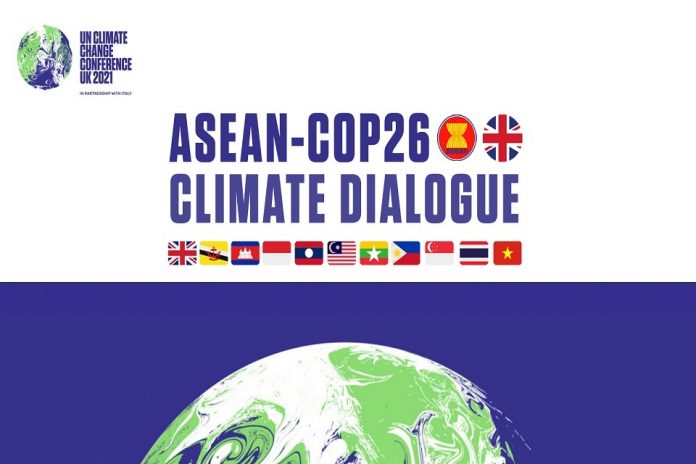Senior policymakers from across all 10 ASEAN Member States – Brunei, Cambodia, Indonesia, Laos, Malaysia, Myanmar, Philippines, Singapore, Thailand and Vietnam – participated in the ASEAN COP26 Climate Dialogue on Nationally Determined Contributions (NDCs) and Long-Term Strategies (LTS). The event marked an important milestone as the first joint event with ASEAN under a new ASEAN-UK Cooperation Framework on COP26.
The ASEAN Working Group on Climate Change’s national focal points, or their delegates from each ASEAN Member State, gave an update on their climate pledges under the Paris Agreement. They reflected on the impacts that the COVID-19 pandemic has had on NDC and LTS development. A major theme of the discussions was the importance of NDCs and their role in driving ambition, setting direction, and supporting domestic policy.
Climate change is a broad challenge, particularly given the wide variety of national circumstances across ASEAN. This diversity reaffirms the need for effective cross-government coordination, and ASEAN collaboration on common issues like carbon pricing, nature-based solutions, capacity building and the energy transition.
Day 1 (24 September): Developing and Enhancing NDCs in ASEAN countries to meet the Paris Agreement
The first day of the Climate Dialogue showcased the importance of capacity, transparency and legal frameworks in successfully implementing NDCs. The benefits and need for putting climate at the heart of COVID-19 economic recovery plans was a key element of the day’s presentations by the UK, IRENA, NDC Partnership and ADB. All presentations recognised need for international support to adapt to changing circumstances, including the economic challenges posed by COVID-19.
It was identified that, while political attention, finance and capacity have shifted from climate change to COVID-19, it is crucial that we use this challenging moment as an opportunity to shift to a green and resilient recovery, and that this can be done in part through more ambitious NDCs. It was also noted that carbon pricing, increased deployment of renewable energy and nature-based solutions play an important role in delivering ambitious NDCs across the ASEAN region.
Day 2 (25 September): Setting long term low emissions development strategies in support of the Paris Agreement goals
Day 2 of the Dialogue was jointly hosted by the UK and Singapore. The UK shared its experience as the first major economy to set a net zero target. Deputy COP26 Envoy Alison Campbell highlighted the benefits an LTS provides in sending strong market signals to industry and informing short-term economic decision-making. The UK also highlighted the 2050 Calculator, a programme supported by the UK which allows ASEAN governments to model future low carbon pathways.
Singapore’s Chief Negotiator for Climate Change, Joseph Teo, shared Singapore’s experience developing its Long-Term Low-Emissions Development Strategy (LEDS) – the first of its kind in ASEAN. Singapore emphasised importance of robust institutional arrangements and whole-of-government approach in galvanising a long-term climate vision. Engagement from industry and citizens have also been crucial in implementing Singapore’s LEDS. The UK and Singapore both emphasised that developing an LTS is not a burden, but an opportunity for new growth and job opportunities, sending a clear market signal businesses will respond to.
At the Dialogue, ASEAN representatives discussed the various challenges they face in adopting LTS, and the value of leveraging existing climate policies and tools for developing future LTS, while the UK, IRENA and 2050 Pathways Platform highlighted the global support on offer.
The discussions which took place over the course of the Dialogue demonstrated the importance of enabling a regional approach, and the role of ASEAN in enhancing collective ambition on climate. Forums such as this can enable valuable exchanges of knowledge and build towards strong co-operation and coordination across ASEAN Member States and their international partners.
The next five years are critical for enhanced climate action, and this is especially true in Southeast Asia, which will suffer some of the worst and most immediate impacts of climate change. We must work together to overcome this challenge. The UK’s COP26 Presidency stressed that international collaboration was needed to achieve greater climate ambition. We look forward to working closely with ASEAN and its Member States on future joint events on nature, adaptation resilience, energy and green finance, and to continue to collaborate on achieving an ambitious, shared outcome at COP26.







